实用大学英语综合教程1Unit 1 College Life共66页文档
大学实用英语(一)Unit1collegelife

surroundings [sə'raʊndɪŋz]
词源:surround(动词)围绕,环绕 surroundings(名词)环境;周围的事物
• to adapt myself to the new surroundings 使自己适应新环境
mature [mə'tʃʊə]
释义1:(形容词adj.)成熟的 • a mature man 一个成熟的男士 释义2:(及物动词vt. )使成熟 • This experience matured her greatly.
• apply to(sth or sb):适用于;应用于 These regulations apply to everyone, without exception.这些规章对谁都适用,没 有例外。
Байду номын сангаас
accumulate [ə‘kjuːmjʊleɪt]
释义:(及物动词)积累
• to accumulate the wealth 积攒财富 • to accumulate money 攒钱(相当
于save money)
▲experience [ɪk'spɪərɪəns]
释义1:(名词)经验;经历 • accumulate the experience
积累经验 • Experience is the mother of wisdom.
经验为智慧之母。 释义2:(及物动词)经历,体验 • experience pleasure/pain
Unit 1 College Life
Structure
• Section A Listening and Speaking • Section B Reading • Section C Tringing Your Hand
college life(大学互交英语1第一单元)

• To broaden the scope of knowledge • To develop good interpersonal relations with fellow students and teachers • To build up a positive outlook and attitude towards life • To discover one’s potential and then make great efforts to bring it into full play
Study methods In high school I learned from the textbooks. In class I took lots of notes and after class I did a lot of homework, I hardly had time to learn anything independently. In college I have discussions with my teachers and classmates, although I do have much homework from the teachers, I often study by myself in the library.
Daily life In high school I seldom helped my parents with the household chores and depended on them for everything. In college I have to be my own---I do laundry, make the bed and clean the dorm all by myself. And I have to plan my budget carefully.
最新-实用英语综合教程第一册第一单元-PPT文档资料
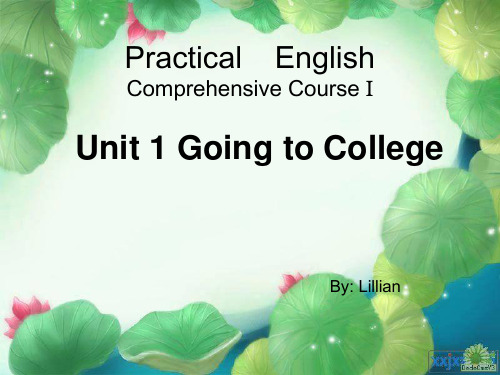
How to find the main idea of the whole passage?
• First paragraph • Last paragraph • Topic sentences • High-frequency words
Detailed reading
• Find out the topic sentence of each paragraph.
Practical English
Comprehensive Course I
Unit 1 Going to College
By: Lillian
Tasks of Text A
• Related information • Pre-reading task • Skimming: to get the general idea • Detailed reading: topic sentences and
love having Fridays off.
Language points
I’m away from home, so I have many things to adjust to.
• adjust to: to get used to by changing behavior or ideas
• Underline the new language points.
Topic sentences
• The topic sentence of para.1 College is a new and different experience for
me. • The topic sentence of para.2 Living at college, first of all, gives me a
实用大学英语综合教程1答案
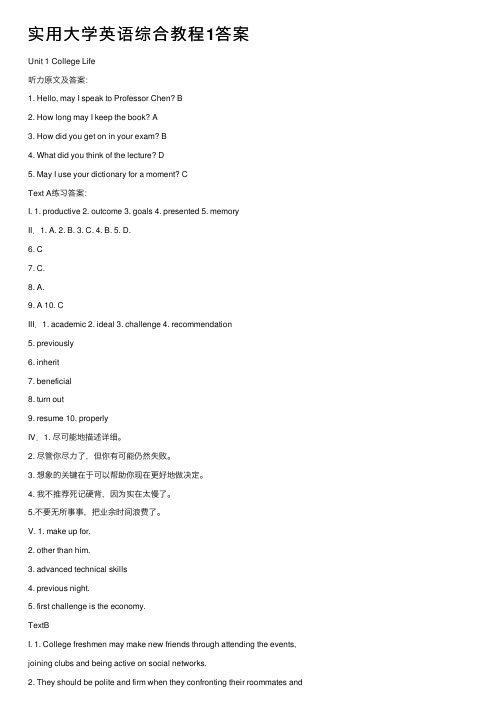
实⽤⼤学英语综合教程1答案Unit 1 College Life听⼒原⽂及答案:1. Hello, may I speak to Professor Chen? B2. How long may I keep the book? A3. How did you get on in your exam? B4. What did you think of the lecture? D5. May I use your dictionary for a moment? CText A练习答案:I. 1. productive 2. outcome 3. goals 4. presented 5. memoryII.1. A. 2. B. 3. C. 4. B. 5. D.6. C7. C.8. A.9. A 10. CIII.1. academic 2. ideal 3. challenge 4. recommendation5. previously6. inherit7. beneficial8. turn out9. resume 10. properlyIV.1. 尽可能地描述详细。
2. 尽管你尽⼒了,但你有可能仍然失败。
3. 想象的关键在于可以帮助你现在更好地做决定。
4. 我不推荐死记硬背,因为实在太慢了。
5.不要⽆所事事,把业余时间浪费了。
V. 1. make up for.2. other than him.3. advanced technical skills4. previous night.5. first challenge is the economy.TextBI. 1. College freshmen may make new friends through attending the events, joining clubs and being active on social networks.2. They should be polite and firm when they confronting their roommates andset expectations and clear boundaries from the beginning.3. Because they may lose out on meeting other people and potential friends. II. 1. confront 2. firmly 3. potential4. offending5. overcome6. acquaintance7. graduation8. gesture9. gossip 10. inevitablyIII. 1. 参加你感兴趣的社团。
全新版大学英语综合教程1 教案Unit1
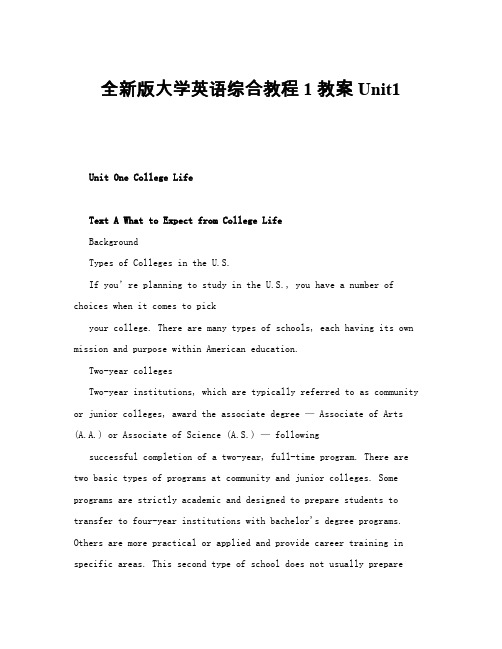
全新版大学英语综合教程1 教案Unit1Unit One College LifeText A What to Expect from College LifeBackgroundTypes of Colleges in the U.S.If you’re planning to study in the U.S., you have a number of choices when it comes to pickyour college. There are many types of schools, each having its own mission and purpose within American education.Two-year collegesTwo-year institutions, which are typically referred to as community or junior colleges, award the associate degree — Associate of Arts (A.A.) or Associate of Science (A.S.) — followingsuccessful completion of a two-year, full-time program. There are two basic types of programs at community and junior colleges. Some programs are strictly academic and designed to prepare students to transfer to four-year institutions with bachelor's degree programs. Others are more practical or applied and provide career training in specific areas. This second type of school does not usually preparestudents for transfer to a four-year institution, though some of the credits earned may still be accepted by a four-year institution.A small number of two-year colleges offer the final two years of the undergraduate program only, awarding the bachelor‘s degree rather than the associate degree. Most community and juniorcolleges are publicly supported by the state and local communities, although some are private. Some private two-year colleges areproprietary or run for a profit.Four-year colleges and universitiesThe college or university (sometimes called an institute when it emphasizes engineering or other technical courses) awards the bachelor's degree. The Bachelor of Arts (B.A.) or Bachelor of Science (B.S.) degrees are the most common, but a variety of bachelor's degrees by other names are also granted. Bachelor's degrees are typically awarded following successful completion of a four-year, full-time program. Programs in some fields of study or at some institutions can be longer than four years. There are both public and private colleges and universities in the United States, and some have an affiliation with a religious denomination.Public versus privatePublicly supported schools are generally state colleges or universities or two-year community colleges. These institutions receive most of their funding from the states in which they are located. Private schools generally have higher costs because they do not receive the sameprimary funding from the state and federal government. Colleges and universities with religious affiliations are private. Most of them are Christian (Roman Catholic and Protestant), although there are a small number of Jewish and Islamic institutions. In most cases, you do not need to be a member of a particular church or religious group to attend a religiously affiliated college and enrollment in these institutions will not usually interfere with your own religious views. Privately owned colleges Proprietary institutions are different from other types of schools in that they are privately owned and run for a profit. They are "educational businesses" that offer services and courses similar to those at other institutions, but you need to be very careful and research their accreditation status. Their programs tend to be technical and pre-professional courses of study.Almost all the colleges in the United States are now coeducational, which means that both men and women attend. There are also a small number of single-sex schools, some for men and some for women. Faculty, administration, and staff members will likely be of both sexes at any college.Words and Expressions1.a little bit有点He was a little bit under the weather. , 他生病了。
最新前景实用英语综合教程第一册unit 1 college
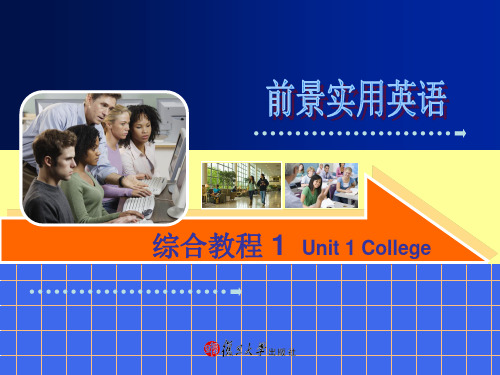
you
rid of
have ever
it.
had,
but
yo34u..
我们一起去还是分头去都可以 wHilel awlsioll hloaovek minotoretfhreeemtimatet.eAr lvsoe,rycollege
(3)__e_xp_e_r_i_e_n_ce__ changes yousroidoena.s for life. You get rid of your feeling of
深圳职业技术学院应用外国语学院
综合教程 1 Unit 1 College
Unit 1 College
Unit 1 College
Part A
Lead in Text Exercise
Part B
Lead in Text Exercise
Part C
Phonetics
Grammar Writing
Part B Lead in
Task 1 Taຫໍສະໝຸດ k 2Part B Lead in
Task 1 Listen to the recording, and complete the following
passage.
get rid of 摆脱,除去
CollDegoeni’s at smmeanll t(i1o)n_m_sio_ta.c_tiT_tee_hty_ris_ civtsh.ee要lfw. 紧Iinncg,oll有eg关e, 系you wnil.l 事me情et lots of
Hello! Hi! Good morning!
Good to meet you. Glad to see you.
• How do you do? • How are you doing? • How is everything? • What’s up? • How’s it going?
新编实用英语综合教程第一册讲稿

Unit OneA. ObjectivesStudents will be able to:1.be familiar with the English names for the college facilities and dormitory items.2.master the techniques to give advice in English.3.acquaint students with the knowledge of college associations.4.write a letter of congratulation in simple words.5.practise the intonation.B. Teaching Procedures●Step One: Starter— Items in a student dormitoryA. Ask students the following questions about the dormitory items:a)Do you live in a dormitory? How many students are there in it?b)What do you think of your dormitory? What do you have in your dormitory?c)Have you ever tried to decorate your dormitory and how?B. Have students finish the exercise: look at the pictures of the dormitory items and match them with the names.C. Check the answers with students.D. If necessary, the teacher can offer more examples of the English names for the dormitory items.●Step Two: I’m homesickA.Ask students about the meaning of the word “homesick”.B.Have students listen to the tape or CD and fill in the blanks.C.Explain the language points, especially the sentence patterns to ask about others, such asa)How are you getting on with your work?b)How are you doing?D.Have students listen to the dialogue again and check the answers with students.1. How are you getting on with college life, Lucy? 露西,大学生活过得怎样?get on (with…) 进展,进行;与……和睦相处e.g. How are you getting on with your work? 你的工作进展如何?2. I frequently feel very lonely. 我经常感到孤独。
《综合英语(第一册)》电子教案Unit1Collegelife
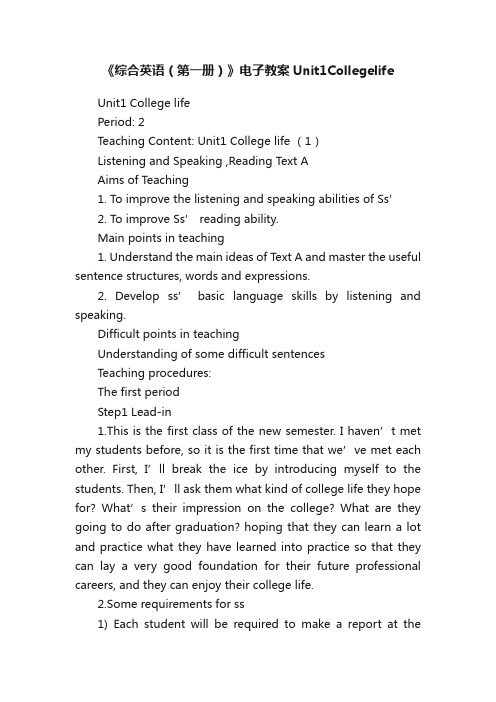
《综合英语(第一册)》电子教案Unit1CollegelifeUnit1 College lifePeriod: 2Teaching Content: Unit1 College life (1)Listening and Speaking ,Reading Text AAims of Teaching1. To improve the listening and speaking abilities of Ss’2. To improve Ss’ reading ability.Main points in teaching1. Understand the main ideas of Text A and master the useful sentence structures, words and expressions.2. Develop ss’ basic language skills by listening and speaking.Difficult points in teachingUnderstanding of some difficult sentencesTeaching procedures:The first periodStep1 Lead-in1.This is the first class of the new semester. I haven’t met my students before, so it is the first time that we’ve met each other. First, I’ll break the ice by introducing myself to the students. Then, I’ll ask them what kind of college life they hope for? What’s their impression on the college? What are they going to do after graduation? hoping that they can learn a lot and practice what they have learned into practice so that they can lay a very good foundation for their future professional careers, and they can enjoy their college life.2.Some requirements for ss1) Each student will be required to make a report at thebeginning of class2) All students are divided into 10 learning groups, with 4 students a group and a group reader will be chosen by themselves3. Tips on how to learn English well at collegeStep2 Listening1. Activity 1 Sound Recognition2. Activity 2 Conversation3. Activity 3 PassageQuestions and Answers1. Q: What is the weather like in Britain?A: It is cool in summer and warm in winter.2. Q: When do the winds bring cool air to Britain?A: In summer.3. Q: Why isn’t there much difference between the summer and winter weather?A: Because the winds from the west blow Britain all the year.4. Q: In which part of Britain is there less rain?A: In the east.5. Q: What is the passage mainly talk about?A: The weather in Britain.Step3 SpeakingThis activity mainly focuses on going over some useful expressions, and how to use them in a real dialog1. Activity 1A: Good morning, Wang Xiaoping.B: Good morning, Huang Linwei.A: How are you this week?B: Just fine. Thank you. And you?A: I’m fine, too. Thank you.A: Hello, Jane.B: Hello, David.A: How are you doing these days?B: Fine, thanks. How about you?A: I’m fine, too. Thank you.B: Is Grace well now?A: She is very well. She is now in China.B: That’s good.The second periodStep4: DiscussionWhat kind of college students do you expect to be?S1:Before I entered the college, I had a dream that I could become the top student in my class. When I woke up, I was determined that I should try my best to make my dream come true. So now I study very hard, and I am sure that my dream will come true some day.S2:After I came to the college, I think that I should develop myself in every field. First, I should study well, and then I should take most of the students’ activities if I am free. I hope that I can become the chairma n of the students’ union of our college, because I can have more chances for practice. In that way, I can learn much more.S3:I hope that I can study well at college. For example, I can read a lot of books, learn a lot from my teachers and classmates, pass every examination and become one of the top students in my class.S4:I hope that I can fully develop myself. First, I can learn as much as I can and pass all the examinations easily. Then, I can make a lot of friends on and off campus so that I can easily get a job after my graduation.Step 5: Fast reading1 Ask ss to read Text A as fast as they can and get the general idea of the passage. Then finish the “reading comprehension” on p82. Close books and concentrate on the recording of Text A3. Read the text aloudStep6 Homework1. Recite the new words on Text A and understand Text A2. Finish off Exs on p10-13。
